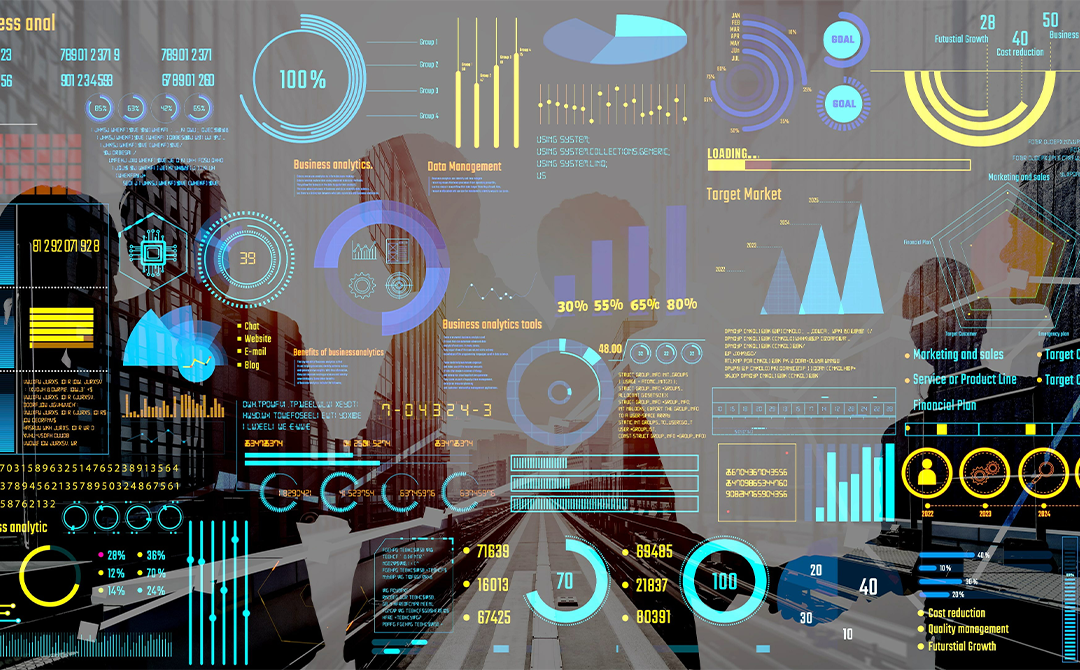
The world is a data-driven society, and enterprises are no exception. Adoption rates for data science have risen recently, and most enterprises are already at some stage of adopting this technology.
This trend paved the way for one of the technical disciplines with the most in-demand roles - data science. According to the U.S. News & World Report’s annual job ranking list, data science is one of the top careers. Also, as per TechRepublic, in 2020 alone, data science jobs have increased by 46%. This continues to grow.
The race is on! Business leaders are trying to keep up with the latest industry trends, customer favorites, and growth drivers for their organizations. So there is no time like now. If you don't have a strong data science team or strategy yet, this article will give some great insights into why it matters so much. And before we delve deep into the ‘how’ of starting a data science career, let’s explore some of its benefits and understand why a career in data science is a lucrative choice by both technophiles and business leaders.
Data science career: Why should you choose it?
Data science has dominated the last few years, and the next decade will be no different. But what's the big deal about this stream? Let us find out.
-
Demand for data scientists continues to rise
Organizations have emphasized the necessity for actionable insights in light of the growing data. Due to this, individuals who can develop these services are in high demand and can further their data science careers with businesses worldwide.
A career in data science is one of the most in-demand occupations in the global employment market. Glassdoor has named data scientists one of the top three jobs in its list of 50 Best Jobs in America for 2022.
-
Industries need data scientists who can thrive in a hyper-competitive market
Even though data science's rising popularity has motivated many young professionals to pursue employment in the field, the sector still faces a significant talent shortage. Basic data science skills are no longer adequate to anchor business operations in today's competitive data-driven market. Further, according to HBR, more than 20% of data scientists spend their time cleaning data rather than providing business insights.
The talent gap can be significantly bridged with the right mix of talented data science professionals and effective data management platforms.
-
Data scientists get sky-high remuneration
Data science is one of the most lucrative fields in the industry. According to the US Bureau of Labor Statistics, a data scientist earns an average of $118,370 annually. In addition, employment prospects in this industry are predicted to rise by at least 19% by 2026, making it even simpler to find work in this field. Though data scientists are not the only professions in the data science sector, it is reasonable to assume that the pay scale is above average for most of those roles. We will delve even further into this topic in the following sections.
-
More and more big brands are hiring data scientists
Data scientists are the new rockstars of big brands. They can command a higher paycheck than software engineers, which means they're also in high demand! Tech companies in and out of Silicon Valley are on the hunt for talent in the data science field. Moreover, data science skills can prove useful outside the tech industry, such as healthcare, finance, supply chain, and retail. For example, Geico, Walmart, Procter & Gamble, and Wells Fargo are just a handful of well-known companies with multiple data science-related positions.
-
Data science opens new doors for enthusiasts
When searching for a role in the data science space, professionals are often boxed in by the role of a data scientist. Though it is one of the keystones positions, other roles such as machine learning engineer, data architect, data engineer, business intelligence developer, and statistician are also common.
Opportunities in data science: Adoption across industries
While there are numerous roles in data science, it is not limited to a single industry. Data is produced every second, every day in various industries. According to Domo, 2.5 quintillion bytes of data are generated every day. Leaders across sectors have found the need to gather, use and analyze data. Therefore, young professionals with the necessary abilities may help create the future of data-driven businesses
Let us explore a few use cases in some of the most prominent industries:
Retail: Data intelligence has the potential to provide unrivaled value to the retail business
The breadth of retail analytics is vast, ranging from monitoring customer feedback via social media metrics, monetizing data, boosting trade promotions operations, and optimizing on-shelf availability. Analysts can reduce costs, improve time-to-value, and increase ROI by using the insights generated from various retail channels. They can also help with platforms that enable personalized customer experiences, price optimization, and targeted marketing campaigns for increased growth.
Data science use cases in retail
One of the widespread use cases of retail analytics is recommendation engines. When shopping on e-commerce portals, retail analysts use AI models to predict customer behavior and recommend products. The suggestions are based on past user behavior, demographic data, user preferences, and a lot more. With this use case, the revenue of retail industries can grow up rapidly. Therefore, data scientists can help retailers significantly by delivering fact-based, data-driven insights.
Telecom: One of the booming sectors for aspirants to build their data science career
The data generated and transmitted via telecommunications networks has reached an all-time high with fourth-generation cellular networks. According to Analytics Insights, Telecom and IT alone accounts for 33% of market data. Data science professionals can use this data and turn them into insights that can improve network optimization, customer experience, and profits across the entire telecom value chain.
Data science use cases in telecom
Telecom analytics can be used to predict increased network traffic during peak hours and take preventive measures to support low latency communication channels. Similarly, data science models can predict customer churn by analyzing data related to network outages. Eventually, having this information handy will help service providers fine-tune their operations and boost customer loyalty. Therefore, data scientists can help the Telecom industry smartly use the huge amount of Telecom data.
Healthcare: Data scientists can transform the medicine and healthcare industry
The health sector is one of the last few to actively adopt data analytics platforms. This is due to the disparate sources of data and the challenges of combining and categorizing them on a single platform for analysis.
However, hospitals and health institutions worldwide have understood the benefits of harnessing analytics in the healthcare sector, like reducing patient costs, providing an accurate diagnosis, remote health tracking, and much more. As a result, healthcare has created new opportunities for data science enthusiasts.
Data science use cases in healthcare
Data scientists have a vast array of Opportunities in data science in the healthcare industry. For example, they use data to construct machine learning models that predict how many preventable hospital admissions will be at any given time or place, giving critical patients access to their care needs when needed. This also helps hospitals make better use of their resources and improve the quality of care while lowering expenses.
CPG: The industry is hunting for data scientists to solve data science scale-up challenges
The CPG industry has some catching up to do with data science and analytics adoption. Millions of SKUs, thousands of personnel, and a complicated supply chain environment contribute to the delayed adoption. The good news is that the industry is undergoing a data-driven change, which has resulted in the emergence of a new breed of CPG analysts. They are searching for data scientists who can help them improve merchandising tactics, avoid stockouts, find growth prospects, and forecast future revenue streams, among other things. Professionals with this skill set are also in great demand for developing bespoke white-box solutions to address CPG-specific use cases.
Data science use cases in CPG
According to McKinsey, CPG firms spend 20% of their revenue on trade promotions. Surprisingly, they lose over 60% of their capital. Embedding AI/ML models into trade promotion strategies can help analyze the efficacy of trade promotions and recommend the best timing, length, and target audience for future promotions. In addition, it enables them to develop data-driven insights and make qualitative judgments fast to improve their trade campaigns.
Data science career growth: Roles and remunerations in data science careers
While data science experts are indispensable in all sectors, there are a wide array of roles in this space that aspiring professionals can look into:
Data analysts
This is an entry-level role in data science. The job entails studying industry data and generating business insights. Data analysts use data samples to generate forecast reports, such as consumer trends, to help executives make decisions.
Skills: Data Visualization tools, MS Excel, Mathematics, Statistics, Machine Learning
Languages: R, Python, HTML, JavaScript, MATLAB, SQL
Salary: $69,517 per annum
Data analyst career trajectory: Data analysts can rise to senior data analysts, pursue a career in data science, or become machine learning engineers with enough expertise in this field. If software development and data infrastructure interest them, they can also pick a data engineering career.
Data scientists
Data scientists, one of the most popular jobs in the data science field, aid in developing machine learning (ML) models that can generate accurate forecasts based on historical data. They must be well-versed in machine learning methods, statistics, and statistical models.
Skills: Distributed Computing, Predictive Modeling, Data Visualization, Statistics, Machine Learning
Languages: R, SAS, Python, MATLAB, SQL
Salary: $117, 212 per annum
Data science career trajectory: Data scientists can specialize in machine learning and become ML engineers or advance to a senior data scientist position.
Data Engineer
Data Engineers oversee a company's data infrastructure and data processing strategies to build information pipelines and provide data scientists with the required data.
Skills: Data API, Data Warehousing, Data Modeling, Database Systems
Languages: R, SAS, Python, MATLAB, SQL, Hive, Pig, Java, C++, Perl
Salary: Typically, a data engineer earns about $102,864 per annum
Data engineer career trajectory: Prospects in this role can move into senior data engineering or management roles.
Business Intelligence (BI) Developer
BI developers concentrate on structuring and organizing data so business owners can access the information they want. To expedite information flow to end-users, they utilize a combination of business intelligence and data visualization technologies.
Skills: Data Visualization, BI tools, Data Modeling, Storytelling
Languages: SQL
Salary: $112,493 per annum
BI developers’ career trajectory: Prospects in this role can move into senior BI roles.
Statisticians
Statisticians have a solid understanding of probability and statistics, which they use in real-world settings to assess and analyze data to make better decisions. Compared to a data analyst position, this job focuses on the mathematics and computational aspects of data.
Skills: Analytical, Technical, Communication, Mathematics, Statistics
Languages: SQL
Salary: $99,989 per annum
Statisticians' career trajectory: Senior statisticians or managers are possible career paths for someone in this job.
Fostering a culture of experimentation through data science
Data professionals need to cultivate a culture of experimentation and innovation to remain ahead of the competition. Analyzing the effectiveness of data intelligence and using it in real-world scenarios will encourage them to embrace their curiosity and consider each setback or error as an opportunity to learn something new. Rather than following a step-by-step model creation, testing, and optimization process, they must adopt a more experimental and agile approach.
When experimental strategies pave new avenues for inventive ideas and new ways to analyze the same facts, a business, and its people flourish. It encourages data scientists to think like entrepreneurs, and each concept or piece of information serves as a springboard to newer, more imaginative approaches to problems.
However, there is always a subtle balance between the scope of experimentation and knowing when to return to tried-and-true methods. A defined roadmap is crucial when setting up a culture of experimentation so that many brains working on the same project do not lead the project astray. It is also a promising idea to link the results of each experimental venture to measurable business outcomes so that data science professionals at all levels can understand why a particular approach worked in a specific scenario or how some insights require further refinement to address specific problem statements. Of course, this is not to say that every stage of an experimental method needs to provide results. Some of them may even serve as a starting point for breakthroughs.
There is no better place for aspiring data science individuals to work in a place that values experimentation. An organization that promotes this approach will give birth to trailblazers and innovators who can provide profitable insights. This excellent atmosphere allows aspiring professionals to polish their talents, learn from their errors, and be the authors of disruptive technology.
Cultivating a culture of thought leadership through data science communities
When fresh graduates work as data scientists, the deluge of data from many sources might be overwhelming. Therefore, they must be a part of communities where they may meet and network with data experts of distinct experience levels. Joining these networks can provide invaluable mentoring and assistance. We've compiled a list of the most popular communities right now to assist you:
Stack Overflow: While this platform provides guidance to software programmers and engineers, its questions and answers in the Data Science sub-category can help freshers address the most often asked problems.
IBM Data Community: Designed to help users grasp data science, it allows users to tap into the expertise of thousands of industry peers. Users may participate in discussion forums, read insightful blogs on data science trends, download whitepapers, and on-demand webinars, and participate in future events.
Kaggle: Google owns Kaggle, a community and a tool that allows users to create data models, explore data sets, and assess their effectiveness. In addition, data science experts can obtain a plethora of knowledge from senior professionals in the industry thanks to the site's 3 million daily members.
Data Community DC: It is a non-profit platform located in Washington, DC, that connects, shares, and promotes the work of data scientists in the United States.
Reddit: There are several Reddit threads and subreddits dedicated to data science. Some concentrate on machine learning, while others cover analytics, artificial intelligence, and data science issues.
Nabble: This community is geared toward beginners, where the R forum is particularly active. Users may ask questions and receive immediate responses from other users.
Women in data science: Women-centered initiatives hold hope for the future
The number of women working in STEM disciplines has been steadily decreasing. Stereotypes and a lack of exposure exacerbate the gender gap. Only 19.7% of data scientists, according to Zippia, are female. However, numbers have lately altered, showing that women's participation is rising. In addition, recent initiatives like Girls Who Code, the National Center for Women and Information Technology (NCWIT), and Women in Data Science (WiDS) have helped address gender diversity.
WiDS has been a driving force in pushing women worldwide to pursue data science careers. The one-day conference, which began in 2015 and has grown to a worldwide scale, has sparked several projects involving women from all over the world. It holds 24-hour conferences in over sixty locations and draws 100,000 women from all over the world. It features keynote addresses, technical talks, and panel discussions on a wide range of topics, from banking to healthcare and agriculture. Further, it also hosts a 'datathon' for women in the data science community to sharpen their abilities and encourage more women to enter the field.
WiDS also features podcasts, education outreach programs, and workshops to encourage girls and women from various backgrounds and nations to pursue a data science career in the field.
Conclusion: Companies worldwide are hiring data science, career aspirants, to advance their digital initiatives
Data science has been on a steady incline in the past few years. Companies from around the globe are looking to hire talented individuals who can help them accelerate their digital initiatives by using data analytics, machine learning, and AI. According to some estimates, data scientists are in high demand and can expect job growth of 100% or more over this same period.
Tredence is hiring over 1,000 technology professionals to build on the talent pool of analytics and engineering professionals in the coming year. To join a team of energetic young data professionals who are the driving force behind the innovations of tomorrow, click here.
Topic Tags




